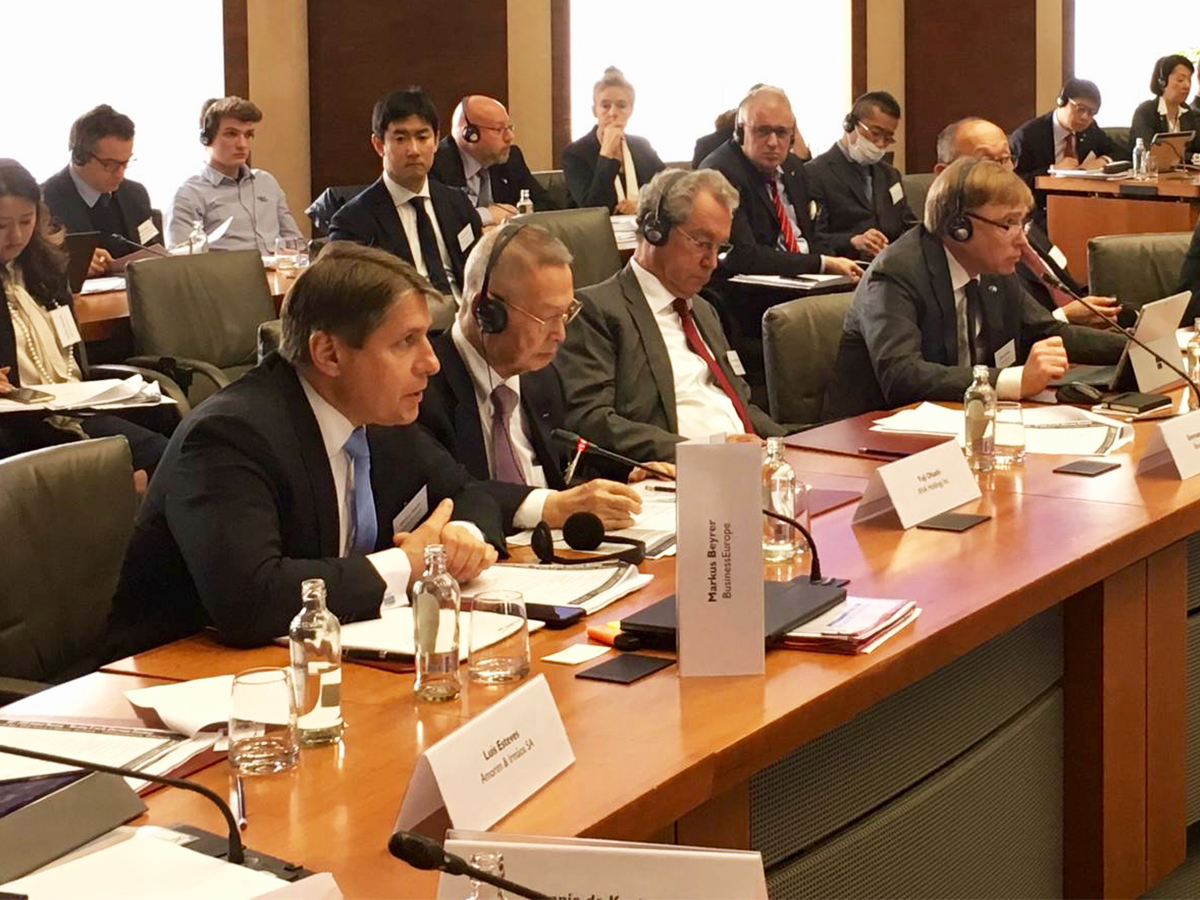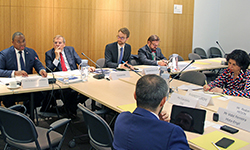BusinessEurope Headlines No. 2019-17
EU and Japan should be at the forefront of the digital revolution

“Technological innovation is impacting our economies and societies at a rapid pace. The 4th Industrial Revolution will seamlessly connect devices and services across a multitude of borders in real-time. The EU and Japan should therefore cooperate together and with likeminded partners to shape the rulebook of the digital economy of the future”, said Markus J. Beyrer, Director General of BusinessEurope, at the 21st EU-Japan Business Roundtable on 15 May in Brussels. Globally, however, digital protectionism is on the rise. Policy-makers should therefore take action against rising protectionist policies in the ICT sector, enable data flows, and protect data while resisting forced data localisation, forced technology transfer and local content requirements. Companies should not be required to transfer or disclose the source codes of their software to governments - the key to their intellectual property - in exchange for being allowed to operate in their markets. “Europe and Japan have the knowledge, ambition, and experience to be at the forefront of the digital revolution. Policy makers should therefore create the frameworks that enable the business community to deliver on our digital expectations”, Beyrer added. The EU-Japan BRT is a group of 50 senior executives from European and Japanese companies and business federations who develop annual recommendations to foster trade, investment, and cooperation on innovation, climate change and industrial standards between the EU and Japan.
Contact: Maurice Fermont
Our comment
Employers committed to tackling workers’ exposure to carcinogens
By Rebekah Smith, Deputy Director for Social Affairs
 European employers are committed to the effective protection of workers from occupational cancer and are actively engaging to find solutions to tackle workers’ exposure to carcinogenic substances at the workplace.
European employers are committed to the effective protection of workers from occupational cancer and are actively engaging to find solutions to tackle workers’ exposure to carcinogenic substances at the workplace.
BusinessEurope supports the setting of binding occupational exposure limit values at EU level when this is justified by scientific evidence, as this helps to provide a level playing field for industry and worker health and safety protection across the EU. In the framework of the Advisory Committee for Health and Safety, employers, together with workers and governments, work to advise the European Commission on new substances to be included in the Carcinogens and Mutagens Directive, or, where new scientific evidence comes to light, to revise already defined occupational exposure limit values.
BusinessEurope has been supporting the successive revisions of the Directive for Carcinogens or Mutagens at work conducted during the mandate of the Juncker Commission, underlying that the setting of limit values must be based on sound scientific evidence, technical and economic feasibility, including to measure workers’ exposure, and a thorough assessment of the socio-economic impact.
However, setting more limit values is not the only way to tackle workers’ exposure to carcinogenic substances, and BusinessEurope strongly promotes actions to raise awareness about the risks arising from exposure to carcinogens in the workplace and the exchange of good practices. Thus, on 25th May 2016, BusinessEurope, together with the European Commission, the European Agency for Health and Safety at Work (EU-OSHA), the European Trade Union Confederation and several EU Member States, launched the Roadmap on Carcinogens, a voluntary action scheme aiming to protect EU workers from occupational cancers.
In the context of the Roadmap, BusinessEurope, together with the EU-OSHA focal points of Belgium, the Netherlands, and Luxembourg, organised a Conference in Brussels on 15 May, entitled “Tackling exposure to carcinogens, the vital role of cross-industry and sectoral organisations”. Around 150 participants from European employers’ organisations and national social partners from Belgium, the Netherlands and Luxembourg took part in the event. They discussed the involvement, ambitions and actions of the sectoral and cross-industry organisations to assist companies to fight against workers’ exposure to carcinogens.
Contact: Rebekah Smith
EU business: a key partner in energy and climate ambition
 “The societal debate that now lies before Europe is how to transform our economy to operate in a state of net-zero greenhouse gas emissions (climate neutrality), while at the same time improving our competitiveness and securing the supply of critical resources”, commented Alexandre Affre, BusinessEurope Director for Industrial Affairs, at “The Express Debates” event on 13 May. Together with a youth and a think-tank representatives and a Belgian scientist, he discussed whether there is a wind of change for climate policy. Affre commented on industry achievements and solutions business provides to contribute to the objective of climate neutrality, stressing as well as that “the implications of this transformation are huge, with far-reaching impacts on society at large that will gradually materialise.”.
“The societal debate that now lies before Europe is how to transform our economy to operate in a state of net-zero greenhouse gas emissions (climate neutrality), while at the same time improving our competitiveness and securing the supply of critical resources”, commented Alexandre Affre, BusinessEurope Director for Industrial Affairs, at “The Express Debates” event on 13 May. Together with a youth and a think-tank representatives and a Belgian scientist, he discussed whether there is a wind of change for climate policy. Affre commented on industry achievements and solutions business provides to contribute to the objective of climate neutrality, stressing as well as that “the implications of this transformation are huge, with far-reaching impacts on society at large that will gradually materialise.”.
![]() Contact: Alexandre Affre
Contact: Alexandre Affre
Strengthening economic ties between Africa and the EU
 On 15 May 2019, BusinessEurope hosted a roundtable between business representatives and negotiators of the Post-Cotonou Agreement, which will govern the relations between the EU and the group of 79 African, Caribbean and Pacific (ACP) countries after 2020. The discussions focused on how the agreement can contribute to bringing EU-Africa relations to the next level by strengthening the economic ties between the two continents. Negotiators from the EU and ACP side exchanged views on trade facilitation and regional integration as well as the investment climate and risk reduction with European businesses and the audience. Representatives of PEDON Group, Mota-Engil, ENI and Siemens presented their companies’ activities in Africa and talked about how the new agreement could contribute to solving some of the problems they face and hence enable them to scale up their operations on the continent. Luisa Santos, Director for International Relations at BusinessEurope, stressed the importance of the proper implementation of the EU’s Economic Partnership Agreements (EPAs) for providing the conditions for African countries to integrate into global value chains: “EPAs are key to facilitating trade between the EU and Africa and also help reduce tariff and non-tariff barriers to regional trade in Africa. The Post-Cotonou Agreement can provide new momentum to the implementation process of EPAs and bring topics like trade in services, investment, competition and intellectual property to the negotiation table”, she said.
On 15 May 2019, BusinessEurope hosted a roundtable between business representatives and negotiators of the Post-Cotonou Agreement, which will govern the relations between the EU and the group of 79 African, Caribbean and Pacific (ACP) countries after 2020. The discussions focused on how the agreement can contribute to bringing EU-Africa relations to the next level by strengthening the economic ties between the two continents. Negotiators from the EU and ACP side exchanged views on trade facilitation and regional integration as well as the investment climate and risk reduction with European businesses and the audience. Representatives of PEDON Group, Mota-Engil, ENI and Siemens presented their companies’ activities in Africa and talked about how the new agreement could contribute to solving some of the problems they face and hence enable them to scale up their operations on the continent. Luisa Santos, Director for International Relations at BusinessEurope, stressed the importance of the proper implementation of the EU’s Economic Partnership Agreements (EPAs) for providing the conditions for African countries to integrate into global value chains: “EPAs are key to facilitating trade between the EU and Africa and also help reduce tariff and non-tariff barriers to regional trade in Africa. The Post-Cotonou Agreement can provide new momentum to the implementation process of EPAs and bring topics like trade in services, investment, competition and intellectual property to the negotiation table”, she said.
Contact: Benedikt Wiedenhofer
Calendar
- 16-17 May: 4th Circular Change Conference
- 20 May: Annual convention for inclusive growth 2019
- 20-21 May: Informal meeting of environment ministers
- 23-24 May: Energy Infrastructure Forum
- 23-26 May: European elections
Reminder: please take a look at our revised privacy policy